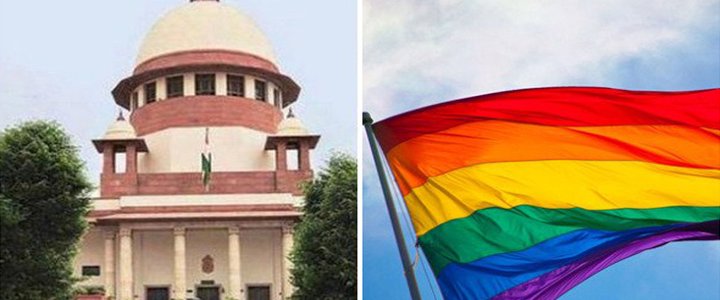
On September 6, 2018 India’s Supreme Court invalidate a colonial-era law, homosexuality between consenting adults by declaring Section 377, which criminalized gay sex, as ‘manifestly arbitrary’. In 1884, an unusual case came up in the Allahabad high court of a person named Khairati on the suspicion that he was found dancing and singing as a woman. He was arrested on a suspicion that he was a “habitual sodomite” and was subjected for a medical examination. It was the first case recorded under the under Section 377 of the Indian Penal Code.
One hundred and thirty four years later , India repealed the colonial law of criminalizing same sex relationships. The fundamental rights of people to live with dignity and get access to healthcare were concurred.
There are many descriptions throughout Hindu and Vedic of demigods, saints and even the Supreme Lord outstripping gender norms & manifesting combinations of sex and gender. Indian epic poetry has several instances of same sex depictions by gods and goddesses. The ancient Indian treatise, Kamasutra talks about feelings for same sexes. There are more than 20 types of genders apart from male and female, such as transwoman, transmen, androgynous, trigender, etc. Gay and transsexual characters in Bollywood have been mimicked and abused. A few positive portrayals like Onir’s My Brother Nikhil, Reema Kagti’s Honeymoon Travels Pvt. Ltd., and Parvati Balagopalan’s Rules:Pyar Ka Superhit Fomula but they been isolated and not mainstream. A few independent films that deal homosexuality are Sridhar Rangayan’s Gulabi Aaina – The Pink Mirror, Girlfriend, Yours emotionally, 68 pages and Ashish Sawhney’s Happy Hookers. Fire by Indian-Canadian director Deepa was the first Indian film that deal openly with homosexual relations. Celebraties also represented, advocated and voiced their opinions for the LGBTQ community in the country.
While the discussion on homosexuality happening in India, the below pride parades have been established in various major cities of India:
- Bengaluru Pride (2008)
- Chennai Pride (2009)
- Chennai Rainbow Film Festival (2013)
- Bhubaneswar Pride (2009)
- Hyderabad Pride (2013)
- Chandigarh Pride (2013)
- Delhi Queer Pride Parade (2008)
- Mumbai Queer Azaadi March (2008)
- Kolkata Rainbow Pride Walk (1999) – This is the first pride march to be organised in South Asia, that was organised by members of the support group Counsel Club, and witnessed participants walking down the streets of Kolkata starting from Park Circus Maidan.
- Pune Pride (2011, second to be established in Maharashtra)
- Ahmedabad Pride Parade (2009)
- Kerala Queer Pride (2010)
- Asia’s first Genderqueer pride parade and Alan Turing Rainbow festival, Madurai (2012)
- Bhawanipatna Pride (2012)
- Guwahati Queer Pride Parade (2014)
- Cochin Queer Pride (2014)
- Queer Gulabi Pride Jaipur (2015)
- Dehradun Pride (2017)
- First Gujarat state LGBT pride parade in Surat (2013)
- Baroda (2014)
- Kerala Queer Pride 2015 at Thiruvananthapuram
- Orange City LGBT Pride March, Nagpur (2016)
- Lucknow (9 April 2017)- Awadh Pride was the first such event to take place in the state of Uttar Pradesh
- Bhopal Pride (2017) – the first Pride event to take place in the state of Madhya Pradesh
- Jamshedpur Pride (2018)
Participants hail various indigenous gender and sexual minority groups in the parades. Western and International tourists also participate in pride celebrations in India.
Here what the members and the supporters have to say :
Jack Harrison Quintana, executive director of Grindr for Equality, an initiative by the gay dating app:
“Quantitatively, the only comparable moment in the history of decriminalisation was when China made our community legal in 1997. But in the case of India, this is a struggle to throw off the legal shackles historically put in
place by the British to control the bodies of their colonial subjects. A decision in our favor will have reverberations all around the Commonwealth from Botswana to Singapore, where activists are still struggling to reclaim their rights in the wake of the British imperial project.
This could result in huge changes for the LGBTQ+ community in India. So many LGBTQ+ people all over the world grow up receiving messages about themselves that we are sick or that our sexual orientation is wrong. It’s impossible to underestimate the toll this can take on our community’s mental health and thus on all aspects of our lives…
None of this is to say that there won’t be more battles to fight. LGBTQ+ activists in India still have a long road ahead to achieve full liberation for our people. Their fierce advocacy has brought things this far and hopefully a decision in our favor will only allow more and more people to join in this fight.”
Divya Roop, androgynous homosexual, a vocal LGBTQ activist, and part of India’s first gay choir group, Rainbow Voices:
“The only thing that’s going to change is we can be assured that we won’t be counted as criminals for loving someone we wanted to…
It’s not going to change much at a personal, professional, or social front because on those levels, individual mindset has to change. I don’t think people changed their minds about women only after the government allowed equal rights to women. Any political or legal change doesn’t really change the mentality of people. That’s a struggle that has to be dealt and fought every single time. Even today, there are several men who still think women are the lesser half of men even though right to equality has been there since forever.”

